Dr. Sarah Sarkis Talks About Anxiety Management and Your Relationship with Anxiety
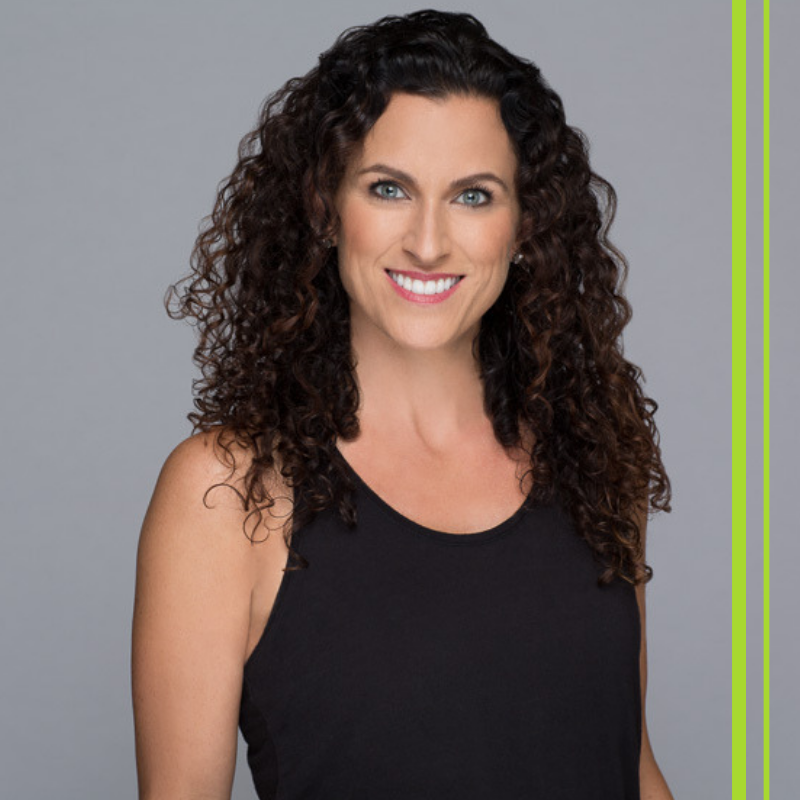
Welcome back to another episode of Your Anxiety Toolkit Podcast. Today we have Dr. Sarah Sarkis on to talk about Your Relationship with Anxiety. Dr. Sarah Sarkis is a psychologist, writer, and performance consultant with a private practice in Honolulu, Hawaii (though it won’t take you long to discover she’s a Boston girl at heart). Her integrated approach is big on science, low on bullshit, empowering us to achieve long-term change and growth through an eclectic blend of psychology, neurobiology, and functional medicine.
Her blog, The Padded Room, is your virtual safe space to help you manage the jarring realities of life. There, you’ll find a soft landing for life’s harshest truths. You can find it at drsarahsarkis.com.
Addressing your relationship with anxiety might be one of the most important steps you take when it comes to your anxiety management. Dr. Sarah Sarkis beautifully shares how she approaches fear and how your relationship with anxiety can determine the degree of suffering around anxiety. She also addressed people’s conceptualization of “I cannot handle this” or “I cannot face this” when it comes to facing fears.
During this interview, we also addressed concepts around Optimum Performance and Dr. Sarkis’ experience in her practice with patients in this area. I am sure you will agree that changing your relationship with anxiety is a game changer when it comes to your mental health, and I am so excited to share this inspiring interview with you
For more information on Dr. Sarah Sarkis, visit:
Website: https://drsarahsarkis.com
Facebook: https://www.facebook.com/drsarahsarkis
Instagram: https://www.instagram.com/drsarahsarkis/
Lastly, the annual IOCDF conference is being coming up SO SOON! It will be held in Austin, TX, from July 19-21. This national meeting focuses solely on Obsessive Compulsive Disorder (OCD) and related disorders. I will be one of the presenters among over 100 presentations, workshops, and seminars. There will be support groups and evening events as well. Click HERE for more information and to buy tickets.

Do you remember podcast episode #92 where I talked about my new goal of Failing 100 times? At the beginning of this year, I set the goal to fail 100 times in my business, personally and in my life. The whole concept came from a podcast episode by Amy Porterfield (EP# 247) where she set the goal to fail 100 times this year, not because she wanted to drop everything and mess up, but because she wanted to set goals that were so high that she was destined to “fail.” The whole premise of failing 100 times was to reach for the stars instead of setting goals that held us back and limited us.
Well, I decided that I was going to fail 100 times this year, but I was hit by a rude awakening that has completely changed the way I think about failure. As some of you may know, I have been struggling with some pretty serious medical and emotional issues this year. It has been a very scary and uncertain journey for me, but I have learned so much about myself. What ended up happening was that I ended up failing in ways I wasn't even expecting and I came to see just how hard I am on myself.
I am scared to share this with you, but I have decided that it is a beautiful day to do hard things. So, this episode is about how I am failing at 100 things that I didn’t set out to fail. I hope you find it helpful and that it inspires you to take a close look at how you conceptualize failure. And finally, I ask you, how are you doing at failing 100 times this year?
There are a few things I want to remind you of before we go! The annual IOCDF conference is being held in Austin, TX, from July 19-21. This national meeting focuses solely on Obsessive Compulsive Disorder (OCD) and related disorders. I will be one of the presenters among over 100 presentations, workshops, and seminars. There will be support groups and evening events as well. Click HERE for more information and to buy tickets.
Catherine DeMonte, who joined us in Ep. 95 of Your Anxiety Toolkit Podcast, is the author of a new self-help book that will be released on June 18, 2019.
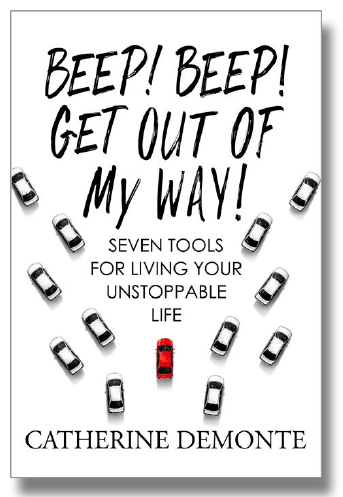
Beep! Beep! Get Out of My Way! Seven Tools for Living Your Unstoppable Life is a practical self-help book grounded in Psychotherapist Catherine DeMonte’s 25 years of clinical psychotherapy practice. Based on the Abundance Circle groups she created and leads, this book contains the tools her clients used to realize their dreams.
Written with nurturing warmth and humor, this book addresses both the inner and outer work necessary for creating lasting shifts. You can manifest your “one big thing”— even when circumstances make it seem impossible.Click HERE to order on Amazon.

Welcome back to another episode of Your Anxiety Toolkit Podcast. Today is a little different. I was all ready to record a podcast and all of a sudden, I put that podcast episode on hold and just spoke from the heart. I just wanted to talk directly to you and remind you to honor your hard things. I know when things are hard and you are struggling, it feels like you have no choice but to give up, but again, always honor your hard thing.
In this episode, I share about a recent “hard thing” I did with my daughter. I shared how surprised I was by how hard it was and emphasized that we do not honor the hard things we do enough. My goal was to address how we compare our struggles in mental health with others who do not have the same struggles. Because of this, we don’t honor the hard things you are doing (which is a lot).
In addition, we judge ourselves for struggling and we make it hard on ourselves when things are already hard. My hope with this episode is to help you along to honor every hard thing you do. My hope is that it gives you a moment to celebrate the work you are doing with Obsessive Compulsive Disorder (OCD), Depression, Panic Disorder, Body Focused Repetitive Behaviors (BFRBs) and Eating Disorders. It is hard work and I honor your hard things.
Before we go, I want to remind you about the upcoming IOCDF conference in Austin, TX, from July 19-21. This national meeting focuses solely on Obsessive Compulsive Disorder (OCD) and related disorders. I will be one of the presenters among over 100 presentations, workshops, and seminars. There will be support groups and evening events as well. Click HERE for more information and to buy tickets.
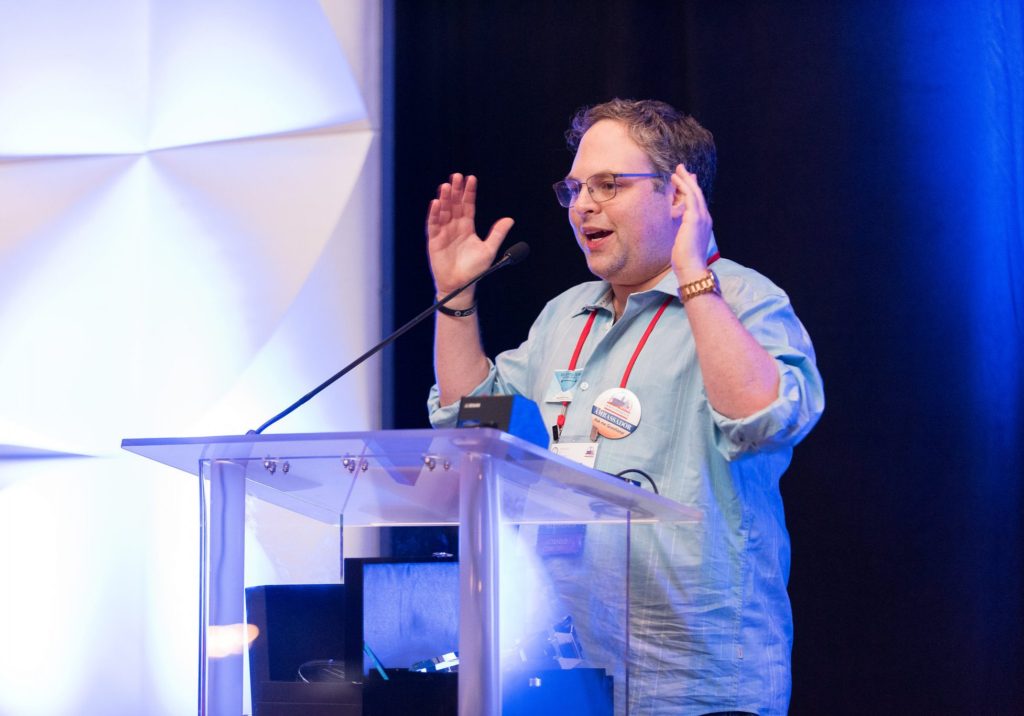
On today’s episode of Your Anxiety Toolkit Podcast, we are talking all about a journey of self-compassion. Yep, that’s right! This is one special episode.
This week we are joined by previous guest, Ethan Smith, the national ambassador for the charity called the International Obsessive Compulsive Disorder Foundation (IOCDF). Ethan talks all about his new experiences and journey of self-compassion and how he has learned a lot about himself in the past year. Consider this Chapter 2 of Ethan's story, as he shares his struggles with taking responsibility for what goes wrong in his life and not blaming Obsessive Compulsive Disorder for his struggles. Ethan also shares how he is learning how to cope with “bad” choices and making mistakes and how he was pushed into the practice of self-compassion when he realized he was still under the spell of internalized stigma of mental health. This is such an important issue and one I want to focus on in the future of Your Anxiety Toolkit.
Ethan also shared his journey of self-compassion as he learns how he would internally compare and contrast the mistakes he has made before, during and after treatment. He talked about how recognizing this process has made him realize how hard he really was on himself. I think we can all resonate with this at times and Ethan beautifully shares his vulnerable and authentic experience.
Ethan addressed how he is now learning to cope with unrealistic expectations and how self-compassion has taught him to accept himself as he is. He talked about how common humanity is a concept that he fought for so long in fear that it will make him complacent and careless.
I am sure you will learn a lot from this episode and I hope that it helps you reflect on your journey of self-compassion.
Before we go, I want to remind you about the upcoming IOCDF conference in Austin, TX, from July 19-21. This national meeting focuses solely on Obsessive Compulsive Disorder (OCD) and related disorders. I will be one of the presenters among over 100 presentations, workshops, and seminars. There will be support groups and evening events as well. Click HERE for more information and to buy tickets.

Welcome back to another episode of Your Anxiety Toolkit. Today, we are talking all about Managing Sleep Anxiety.
It is very common for my clients to report significant anxiety at bed time and during sleep. They might report trouble getting to sleep, racing thoughts while trying to fall asleep, trouble staying asleep, waking up panicking, or ruminating on an event or worry.
In this episode, we are not talking about the specific medical side of sleep disturbances. We are talking specifically about managing sleep anxiety.
Did you know that more than 40 million Americans suffer from a sleep disorder? (according to the National Institutes of Health). And, did you know that 50% of those with GAD have a sleep disorder? These statistics blew me away and made me realize I need to be addressing this issue more often.
I am sure you will agree that stress and anxiety may increase sleeping problems or make existing problems even worse. Many will report that their sleep quality is much reduced when they are going through a difficult time in their lives.
But, the real question is, which one comes first? Sleep disorder or Anxiety Disorder? We will discuss this in this episode. In this episode, we also address sleep hygiene, caffeine intake, and the importance of exercise when it comes to managing anxiety. We also talk about the importance of reducing screen time, keeping naps to a minimum and the necessity of seeing a sleep specialist if you are really struggling.
I really hope this episode helps you manage sleep anxiety just a little better. It's a beautiful day to do hard things, CBT School community!
Before we go, I'd like to remind you about two amazing events coming up and a way for you to give back to the OCD community!
International OCD Foundation 1 Million Steps 4 OCD Walk
What: The IOCDF is hosting their 1 Million Steps 4 OCD Walk in Calabasas on Saturday, June 1, to increases awareness and raises funds for the IOCDF and its Local Affiliates so they can continue their mission. I will be walking at this one! There are many walks happening so be sure to check your area if you are interested.
When: June 1
Where: Juan Bautista de Anza Park | Calabasas, CA
Click HERE for more information and to register.
International OCD Foundation Annual Conference
What: Since 1993, the Annual OCD Conference has been the only national meeting focused solely on obsessive compulsive disorder (OCD) and related disorders. The unique event allows people with OCD and their loved ones to learn about the latest OCD treatment and information alongside the mental health professionals who care for them. The Conference features more than 100 presentations, workshops, and seminars as well as nearly two-dozen support groups and various evening events. Presenters include some of the most experienced and knowledgeable clinicians and researchers in the field, as well as people with OCD and family members sharing their stories about life with OCD.
When: July 19-21
Where: JW Marriott Austin, Austin TX
Click HERE for more information and to buy tickets.
Giving Back
During the month of May, Shala Nicely is giving 100% of her royalties from Is Fred in the Refrigerator? Taming OCD and Reclaiming My Life to the International OCD Foundation for the conference scholarship fund. In celebration of the one-year anniversary of Fred’s publication, she hopes to raise enough money to send at least 5 people in need to the conference. And with your help, we can send even more!
As Shala shares in the Fred chapter “Changing the OCD Mind,” going to her first IOCDF conference was life-changing: she finally learned about exposure and response prevention therapy (ERP) for OCD and actually tried the therapy on her own, realizing with amazement that ERP gave her the power to reclaim her life.
If you have OCD, know someone with OCD, treat OCD, or have ever been curious what OCD is really like, please purchase a copy of Fred. As I wrote in my endorsement of the book, “Is Fred in the Refrigerator? is a stunning story of growth, perseverance and hope. Shala beautifully details how mental illness shaped her life, taking us with her on her brave journey through perfectionism, shame and fear. This book is the perfect combination of entertainment, education and validation for those who are on their journey to recovery from OCD, but also for any human being who wants to live courageously and joyfully.”

100% of the royalties from every book sold will directly support sending people with OCD to the IOCDF conference, where they will learn that they, too, can reclaim their lives. Thank you!
How To Be Uncertain In the Management of OCD

Welcome to this week's episode of Your Anxiety Toolkit.
When it comes to the management of anxiety, practicing being uncertain is the key to long-term recovery. We must face our fears and purposely not try to solve what will happen and what we would do if our fear came true. For anyone attempting this, we can all agree that being uncertain is a very difficult skill to practice. I have found that while my clients logically are on board with the idea of being uncertain, they still struggle with HOW to be uncertain. Cognitively, we know the importance of uncertainty, but the actual practice of it might not be something that we are fully on board for.
Nearly every day, a client or a follower on social media (Instagram, Facebook, Twitter) will ask me HOW to be uncertain. They might say, “Kimberley, I get that I have to lean into the uncertainty, but HOW do I actually be uncertain?”
In today’s podcast episode, we talk all about how to be uncertain and what major roadblocks might be causing you to bypass uncertainty. We also talk about some key mindfulness tools to help with the practice of uncertainty when managing strong obsessions and compulsions. This is a very important concept when it comes to anxiety management, so I would love to hear your thoughts.
There are a few very exciting events coming up!
The IOCDF is hosting their 1 Million Steps 4 OCD Walk in Calabasas on Saturday, June 1, to increases awareness and raises funds for the IOCDF and its Local Affiliates so they can continue their mission. I will be walking at this one! Click HERE for more information and to register.
Also, the IOCDF Annual Conference will be held in Austin, Texas, from July 19-21. I will be speaking at this event and love seeing you there! Click HERE for more information and to buy tickets.
100th Episode Virtual Party!

Welcome to another episode of Your Anxiety Toolkit Podcast. This episode is a very special one for us. We are celebrating out 100th Episode and we are having a VIRTUAL PARTY! At this party, we want you to celebrate this wonderful community of brave and courageous people who stand by each other as we go through hard things and we do hard things.
For this virtual party, we invited some of our favorite guests and asked them to share some wisdom, a funny story or dance the night away with us.
First up, we have Ethan Smith who was on Ep. 53 (How Advocacy “Keeps Me Well”: Interview with Ethan Smith OCD Advocate) and he starts the evening off in the most glamorous way.
Sheva Rajaee who was Ep 45 (FIVE Roadblocks to Anxiety Recovery (w/ Sheva Rajaee) shares a wonderful story about Octopi and how adaptable they (and we) are.
Chris Tronsdon who was on Ep 97 (The Emotional Stages of Recovery – Rebuilding Life After OCD with Chris Tronsdon) shared a wonderful and inspiring story of having Obsessive Compulsive Disorder (OCD) and then led us into a fabulous dance.
Nathalie Maragoni from Ep 65 shared her love for our community and how proud she is of us all.
Shala Nicely from Ep 16 (Guilt, Shame and being “SO OCD” with CBT ROCKSTAR Shala Nicely), Ep 36 (This EASY tool Might Change Your Way of Coping with Anxiety with Shala Nicely) and Ep 78 (Tips To Help You Share Your Mental Illness With Others) Shared her words of wisdom and also has a wonderful and generous gift she is sharing with the OCD community.
Catherine DeMonte from Ep 95 (Love vs. Fear with Catherine DeMonte) shared a wonderful piece about how we must choose love over fear and allow love to lead us. Catherine always has beautiful things to share with us.
Jon Hershfield from Ep 42 (Dispelling The Myths About Managing Anxiety and Obsessive Compulsive Disorder) And Ep 85 (Harm OCD with Jon Hershfield) as always brings humor and wit to our interactions.
Michelle Massi from Ep 84 (How to Manage Social Anxiety (with guest, Michelle Massi, LMFT) Beautifully shares what she loved about being on Your Anxiety Toolkit Podcast and we 100% cannot wait to have you back on Michelle.
Alegra Kastens, our fabulous and hard-working CBT School assistant gives us a huge dose of inspiration and support with her beautiful words of hope and faith. Thank you, Alegra!
Of course, no party is complete without Jeremy Quinlan from Ep 99 (Making The Choice to Embrace Panic with Jeremy Quinlan) who shows us late and always causes trouble. Thank you, Jeremy, for showing your handsome face!
The lovely and wise Zoe Gillis from Ep 19 (Nature just might be the ULTIMATE Mindfulness Tool with Zoe Gillis) shared how she experiences parties and brings a unique and thoughtful approach to our 100th episode (always making me think outside the box).
And, true to form, Patrick McGrath from Ep 64 (Don’t Try Harder, Try Different with Patrick McGrath) brings his hilarious jokes and firm direction for those who are working on anxiety and recovery.
And, last but not least, Chrissie Hodges from Ep. 67 (Grieving the Losses of Mental Illness) shares a powerful message for those who are in the throes of anxiety and OCD recovery. I just adore her thoughts and wisdom.
I cannot thank you all enough for all of your support and excitement. Thank you for joining us for this virtual party! I have loved every minute of this podcast...all the minutes of recording, editing, and preparing. Thank you so much, CBT School community! Here is to another 100!
Jeremy Quinlan Talks About Panic Disorder and Choosing to Embrace Panic

Welcome back to another episode of Your Anxiety Toolkit Podcast. Today we have a very special guest. For me, this is THE most special guest, because this week I had the honor of interviewing my husband about Making the Choice to Embrace Panic.
In this episode, Jeremy tells the story of his Panic Disorder, how panic took so much from him and how he made the choice to embrace panic, instead of run from it.
I have wanted to record this episode for the longest time, but life, work, family and business always got in the way. But, on a beautiful spring day, we both sat down while the kids were at school in our lounge room and recorded his story.
Together, we talked about the fear of flying and how this caused him to exit off many flights in a state of panic. We also talk about his fear of driving on the highway, fear of getting on elevators, fear of getting on a train or a trolley or a taxi cab, etc. We also got very deep into the experience of panic disorder and what it felt like to have a panic attack. Jeremy described his specific experience of panic and how it made him fear he would hurt someone or lose control of his body.
What I loved the most was how he shared his bumpy journey to recovery. Jeremy carefully describes what that journey with panic felt like and how he made an intentional decision to “choose life” over running from anxiety, panic, and dread. He addressed how he came to a place where he could see that he had only two choices: choose to embrace panic or to keep running and let it take over his life.
I am so excited to share this episode with you, CBT School community. I hope he inspires you as much as he inspires me.
Three Mindfulness Basics for Anxiety and Depression
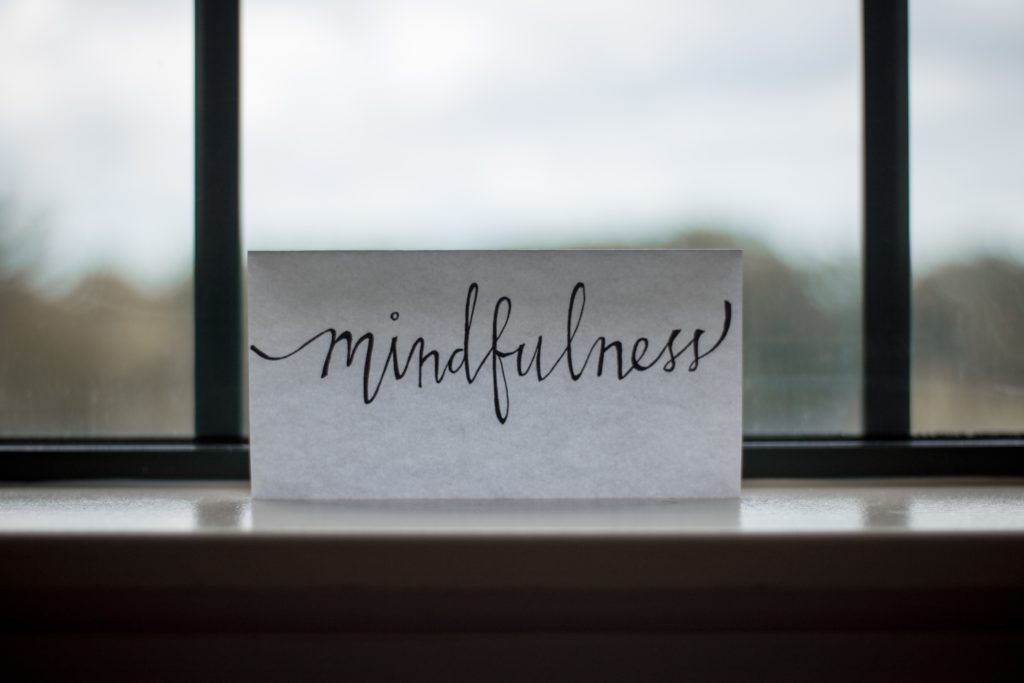
Welcome back to another episode of Your Anxiety Toolkit Podcast.
Do you ever feel like you have to go back to basics? Maybe you feel overwhelmed with all the “tools” and strategies you need to practice to manage your anxiety, obsessions, compulsions, and emotions. Maybe you are feeling like you need to simplify your mental health practices so that you only have a few things to manage instead of many.
If you are feeling this way, you are not alone. I recently realized that I had to return back to some mindfulness basics and review the tools that helped me many years ago. In today’s episode of Your Anxiety Toolkit, I talked about the 3 mindfulness basics for anxiety and depression that you must return to when you are struggling with anxiety, stress, life events, depression, and grief.
In this episode, we talk about how we sometimes refuse to go back to the basics because we are afraid it means we are “going backward.” We dispel this myth and address how these 3 mindfulness basics for anxiety and depression can recharge our mental health plan and practice.
If you'd like to learn more about mindfulness skills that I teach my face-to-face clients who struggle with Obsessive Compulsive Disorder (OCD), we have an online course available on CBTschool.com called Mindfulness School for OCD. Click HERE to learn more and sign up.
Before we go, I want to remind you of two wonderful upcoming events! The TLC Foundation will host their annual conference on Body-Focused Repetitive Behaviors from May 2-4 in Virginia. Click HERE for more information and to buy tickets. Also, the IOCDF Annual Conference will be held in Austin, Texas, from July 19-21. I will be speaking at this event and love seeing you there! Click HERE for more information and to buy tickets.
Chris Trondsen Talks Rebuilding Life After OCD
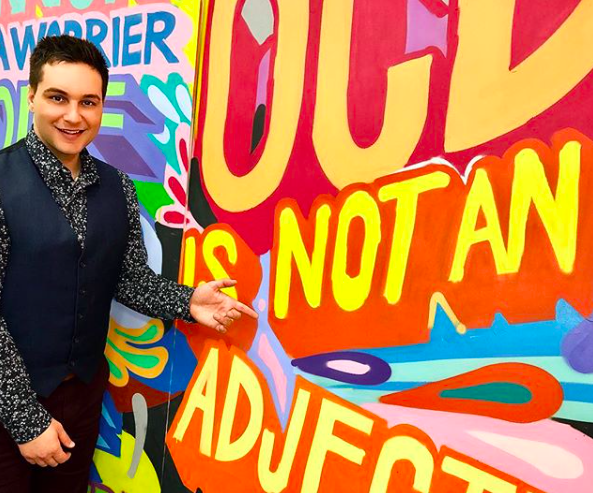
Do you ever wonder what life will look like after OCD Treatment? If so, this is the podcast episode for you!
We are talking all about the common emotions involved with the recovery process from mental illnesses such as Obsessive Compulsive Disorder (OCD), Anxiety, and depression in today’s episode of Your Anxiety Toolkit Podcast. Many of you have asked for more episodes about the emotional side of Obsessive Compulsive Disorder (OCD), Anxiety, Depression, Eating Disorders, and Body Focused Repetitive Behaviors (BFRB’s), as well as what life is like after mental illness.
In today’s episode, we talk with Christopher Tronsden on Rebuilding Life After OCD. In this episode, Chris Tronsden talks about his childhood of “confusion” about his symptoms and thoughts and how he was claimed to be a “difficult child.” Chris Tronsden also talks about how he moved towards isolation after being wrongly diagnosed with other mental illnesses, and resultantly survived a suicide attempt. Chris shares the emotions he experienced after this suicide attempt and how it led him to finding the correct treatment for OCD (Exposure and Response Prevention) and moving towards Rebuilding life after OCD Treatment.
What I loved the most about Chris’ story is how beautifully he explains and articulates the process of building up the courage to perform Exposure and Response Prevention and then having to manage the painful experience of anger and loss after his OCD treatment. Chris Trondsen explains how he had to have some difficult conversations with loved ones and himself before he could turn his battle into something that was meaningful.
Chris ends the podcast episode with a beautiful message of hope for those who are at all stages of treatment and recovery. His message really does give hope to those who are embarking on the process of rebuilding life after OCD Treatment.
Thank you, Christopher Trondsen, for a beautiful interview.
For more information on Chris, visit:
IOCDF SoCal: https://ocdsocal.org/about-us/board-of-directors/
Twitter: https://twitter.com/christrondsen?lang=en
Instagram: https://www.instagram.com/christrondsen/?hl=en
Facebook: https://www.facebook.com/ChrisTrondsen
Email: christrondsen@gatewayocd.com
Dr. Jed Siev Talks Religious (scrupulosity) and Moral Obsessions
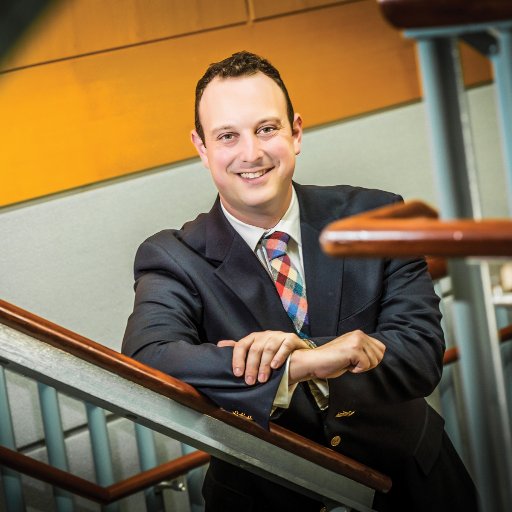
Welcome back to another episode of Your Anxiety Toolkit Podcast. Today, I am so thrilled to talk with you about Religious and Moral Obsessions. In this episode, I was honored to talk with Dr. Jed Siev. Dr. Jed Siev is an Associate Professor in the Psychology Department at Swarthmore College and is skilled in treating Obsessive Compulsive Disorder (OCD), specifically Religious and Moral Obsessions. Religious and Moral Obsessions are very common among OCD sufferers and I am so thrilled to share with you.
I was able to take some questions from followers on Instagram (@kimberleyquinlan) for this episode and Jed Siev did such a great job of bringing compassion, skill, and research into the conversation.
Here are some of the questions we addressed in the interview:
What is scrupulosity?
What are the common obsessions and compulsions for Religious (scrupulosity) and Moral Obsessions?
How does Scrupulosity differ from Moral Obsessions?
What does treatment for Religious (scrupulosity) and Moral Obsessions consist of?
Does treatment for Religious and Moral Obsessions differ for different common religions?
The below questions from listeners are addressed:
Is it helpful to involve a member of clergy when treating religious OCD?
Is it common to question whether you are a good person or just do a good thing to prove you are a good person?
How do you practice acceptance of thoughts and obsessions even if it feels so against your morals?
When you struggle with religious (scrupulosity) and Moral Obsessions, how do you teach your younger child to pray?
Why is there such a strong feeling of guilt attached to Religious (scrupulosity) and Moral Obsessions?
How do you address the fear of doing things that are disloyal?
What to do if you keep judging your actions?
What to do if you keep putting shame on yourself?
Thank you for everyone who submitted these questions. I am sure you will find this episode very, very helpful, as I learned so much from Jed Seiv.
For more information on Dr. Siev, visit:
https://www.swarthmore.edu/psychology/faculty-staff
EXCITING NEWS...OCDeconstruct is THIS WEEKEND!! OCDeconstruct is a free online conference designed to give those with OCD, and their loved ones, the information needed to understand key concepts related to the disorder so they can get a productive start on treatment. During the conference, six therapists will present on topics including intrusive thoughts, ERP, family dynamics, medicine and more. OCDeconstruct happens on Saturday, April 13 and will run about 4 hours.
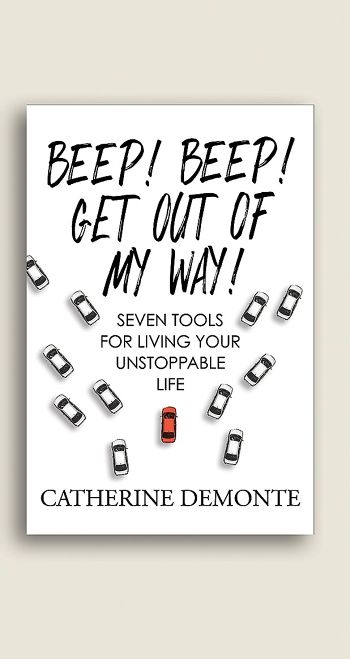
Welcome back to another episode of Your Anxiety Toolkit Podcast. Today we have someone who is very dear to my heart: Catherine DeMonte.
Over a year ago, I had the privilege of joining a women’s group called an Abundance Group, run by Marriage and Family Therapist, Catherine DeMonte. Catherine was so inspiring to me and gave me some of the tools I needed to get me inspired and motivated to create CBTschool.com. That’s right you guys! Catherine was one of the people who stood next to me as I cultivated the seed of CBTschool.com. For that, I am forever grateful.
In Catherine DeMonte’s abundant circles, I learned how to lead with love, not fear. While this was a concept I already knew, Catherine helped me to put this into play as I created CBTschool.com and created a life that lined up with my values. Catherine has such a beautiful heart and a beautiful way of speaking in a compassionate and gentle way. In this interview, she delivers tools that will help you tap into the wonderful beauty of your heart and create a life you really want. She talks about love vs. fear. Catherine talks about what it's like to lead with love vs. fear.
In this episode of Your Anxiety Toolkit, Catherine talks to us about being open to receiving love and health and compassion and support. She shares with us some of her amazing tools that she has included in her upcoming book, Beep! Beep! Get Out Of My Way!
Catherine De Monte also talks about involving deep desire to the hard work that you’re doing with Exposure and Response Prevention and she teaches us how to practice grace and gratitude as we work towards our anxiety recovery. I very much love this episode and I hope you do too.
Lastly, I want to remind you about an upcoming event that I am thrilled to be speaking at: OCDeconstruct!
OCDeconstruct is a free online conference designed to give those with OCD, and their loved ones, the information needed to understand key concepts related to the disorder so they can get a productive start on treatment. During the conference, six therapists will present on topics including intrusive thoughts, ERP, family dynamics, medicine and more. OCDeconstruct happens on Saturday, April 13 and will run about 4 hours.
Life after OCD with Shawnté Johnson
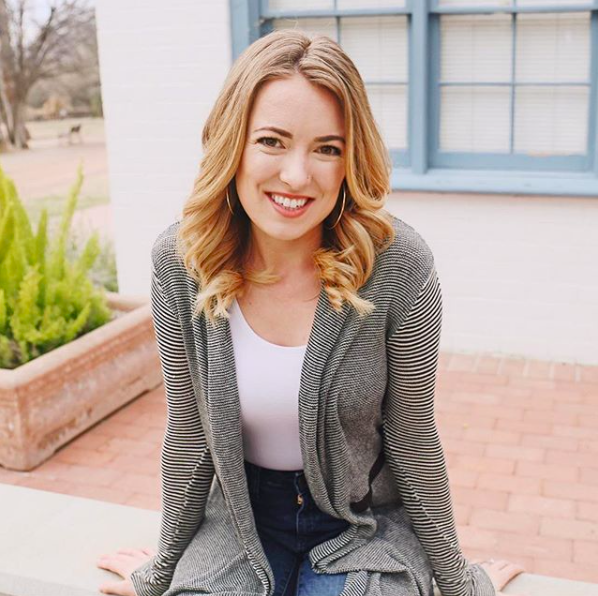
Welcome back to another episode of Your Anxiety Toolkit Podcast! Today, we talk about life after OCD.
So often, my clients in my private practice have questions about what recovery for anxiety and Obsessive Compulsive Disorder looks like. Clients and social media followers are often asking me what “recovery” means and how can they get there. Understanding recovery is a crucial part of taking those first steps towards fear.
Today, I am thrilled to share with you Shawnté Johnson, an OCD advocate and blogger who not only talks the talk on recovery but walks the walk too. Shawnté Johnson has a blog called Life After OCD and she talks so beautifully not just about life after her recovery from OCD and Anxiety, but also life before and during treatment.
In this week’s episode, Shawnté talks about how “doing hard things” is worth it and how she learned to embrace facing her fears and took on an approach where she commits to facing her fears every day. Shawnté shares her own story and how she chose her own values over fear. She talks about how she was “enslaved” to her OCD and how she “chose faith over fear."
What I loved so much about what she talks about is how fear was motivating much of her decisions and how she found her own form of motivation to take her life back from anxiety, fear, and panic. Shawnté also talks about recovery being a long game and how she stays aligned with the core concept of her OCD and anxiety treatment. There is life after OCD!
You can find Shawnté at:
Instagram: https://www.instagram.com/lifeafterocd/
Before we go, I want to remind you about upcoming events that I am thrilled to be speaking at: the OCD SoCal Conference and OCDeconstruct!
This Saturday, March 30, I will be speaking at the OCD Southern California 4th Annual Conference alongside other OCD specialists and advocates. I’ll be speaking during the breakout session titled Managing OCD Roadblocks: Creative and Effective Tools to Tackle ERP. For registration information, visit ocdsocal.org or click HERE.
OCDeconstruct is a free online conference designed to give those with OCD, and their loved ones, the information needed to understand key concepts related to the disorder so they can get a productive start on treatment. During the conference, six therapists will present on topics including intrusive thoughts, ERP, family dynamics, medicine and more. OCDeconstruct happens on Saturday, April 13 and will run about 4 hours.
Do you want to get weekly free content from us, right to your inbox? SIGN UP HERE FOR OUR NEW WEEKLY NEWSLETTER! The weekly newsletter includes free mental health tips and tools, information about upcoming events with Kimberley. and free coupons for CBT School products.
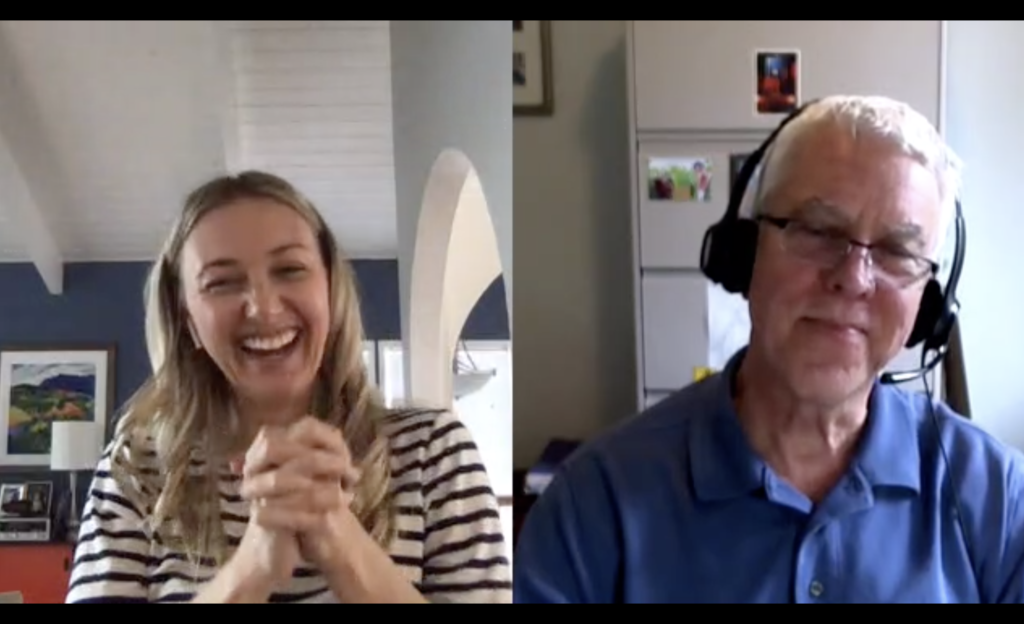
Welcome back to another episode of Your Anxiety Toolkit. You are going to LOVE this week's podcast interview with Dr. Reid Wilson. For those who don’t know Dr. Reid Wilson, he is a world-class specialist in the area of Anxiety Disorders. Dr. Reid Wilson is the Director of the Anxiety Disorders Treatment Center in Chapel Hill and Durham, NC, and is Adjunct Associate Professor of Psychiatry at the University of North Carolina School of Medicine.
Dr. Reid Wilson is the author of the amazing book for Panic Disorder, called Don’t Panic, and the co-author of wonderful books such as Anxious Kids, Anxious Parents, Stop Obsessing! and Playing with Anxiety.
Dr. Reid Wilson is a Founding Clinical Fellow of the Anxiety and Depression Association of America and a Fellow of the Association for Behavioral and Cognitive Therapies. So, I am sure you are wowed already, but wait for it! This episode will blow your mind even more.
In this week’s episode, I talk with Dr. Reid Wilson about a perspective change and an attitude change from one where we do not want anxiety to one where we WANT anxiety. I know this may seem strange, but believe me, this will change your whole game when it comes to the treatment of anxiety, Obsessive Compulsive Disorder (OCD) and other anxiety disorders.
In this episode, we address the following topics.
- Why do we want anxiety?
- What is going on in our brains when we have anxiety and when we face our fears
- How to get a client to do Exposure & Response Prevention
- How to Engage the Ambivalent or resistant OCD Client
- A different approach to the ERP hierarchy?
- How to have a complete Attitude change about fear and anxiety.
Please consult Reid’s other site, Anxieties.com, for additional information, videos, resources, and treatment options.
Before we go, I have a few exciting events to tell you about! I’ll be speaking at both the OCD SoCal Conference and OCDeconstruct.
On Saturday, March 30, I will be speaking at the OCD Southern California 4thAnnual Conference alongside other OCD specialists and advocates. I’ll be speaking during the breakout session titled Managing OCD Roadblocks: Creative and Effective Tools to Tackle ERP. For registration information, visit ocdsocal.org or click HERE.
OCDeconstruct is a free online conference designed to give those with OCD, and their loved ones, the information needed to understand key concepts related to the disorder so they can get a productive start on treatment. During the conference, six therapists will present on topics including intrusive thoughts, ERP, family dynamics, medicine and more. OCDeconstruct happens on Saturday, April 13 and will run about 4 hours.
Do you want to get weekly free content from us, right to your inbox? SIGN UP HERE FOR OUR NEW WEEKLY NEWSLETTER! The weekly newsletter includes free mental health tips and tools, information about upcoming events with Kimberley. and free coupons for CBT School products.

Welcome back to another episode of Your Anxiety Toolkit Podcast! Want to know four massive changes I have made in my life? Well, here you go! In today’s episode, I will present to you four massive changes that I have made in my life that have changed the way I see myself, the way I spend my time and, lastly, the approach I have with perfectionism and mistakes.
If you are someone who is hard on yourself, beats yourself up for not being perfect or productive or just for existing, this episode might be really helpful for you. If you are someone who lets fear stop you from pursuing your dreams or even doing a smaller task, this is the episode for you. In this podcast episode, we will address time management, setting intentions and surrounding yourself with people who will inspire you and hold you accountable to your big dreams and with the hard struggles you are going through.
One of the points I am so excited about is my new plan to FAIL MORE! Yes, you heard and read correctly. I plan to fail more this year. More than I ever have. As Amy Porterfield says in this podcast episode, failing can get you closer to your goals. As I also plan to aim higher and be 100% intentional as I go.
The massive changes I have made in my life have made me into a bolder, braver and more confident person. I hope they inspire you too.
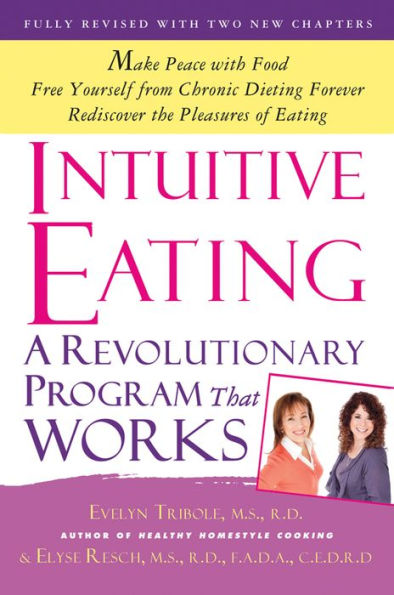
Welcome to another episode of Your Anxiety Toolkit podcast. This week’s podcast episode is very dear to my heart. My intention with this podcast is to give you all some direction with food and body, specifically if you struggle with immense fear around food. This week’s episode has the most amazing guest, Evelyn Tribole, the author of Intuitive Eating: A Revolutionary Program That Works.
In this week’s interview, we break down some of the barriers between fear and food. Evelyn does a great job at identifying why there is so much fear surrounding food, addressing societal, cultural and familial rules around food. We discussed how, for many, food creates anxiety for us personally, or how our anxiety manifests a bad relationship with food.
Evelyn Tribole discusses :
- What is Intuitive Eating?
- Why is Intuitive Eating so important?
- What is diet culture and why is it such an important concept to understand?
- What happens when you don't Intuitively Eat?
Evelyn also answers some questions given specifically by the CBT School family. Here are a few questions she addressed:
- How can I introduce myself to Intuitive Eating?
- What are the steps of Intuitive Eating?
- How do I avoid the extremes of eating? I am either eating “too unhealthy and too healthy as a compulsion.”
- How do I address Emotional Eating or “bad” eating because of a hard day?
- How do I attempt Intuitive Eating if I HAVE to lose weight because of health reasons?
- How do I manage the fear of gaining more weight?
- How do you make all foods neutral whilst also finding joy in food?
- How do I not get trapped in diet culture?
- How long does it take to get a good handle of Intuitive Eating?
- How do I begin to desire and have the persistence to intuitively eat while having an Eating Disorder?
- Due to mood changes, how can I eat when I don’t want to?
- What is the best way to stick with Intuitive Eating?
- What is the best way to approach Nutrition for Anxiety Disorder?
- How does Anxiety impact hunger cues. etc.?
- How do I address Avoidant and Restrictive Food Intake Disorder?
For more information on Evelyn Tribole, visit: https://www.evelyntribole.com/
Do you want to get weekly free content from us, right to your inbox? SIGN UP HERE FOR OUR NEW WEEKLY NEWSLETTER! The weekly newsletter includes free mental health tips and tools, information about upcoming events with Kimberley. and free coupons for CBT School products.
Not Alone Notes (Morgan Rondinelli and Molly Fishback)
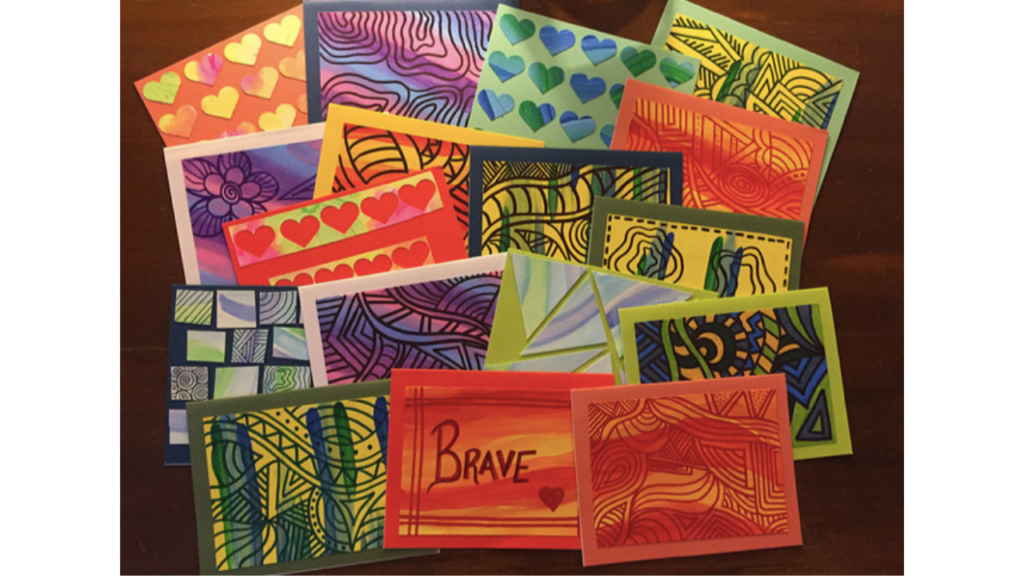
Welcome back to another episode of Your Anxiety Toolkit.
One of the most common statements I get from new clients when I meet them in my office is, “I feel so alone.” After waiting and being so afraid to finally talk with someone about their mental illness and personal struggles, they are overwhelmed with isolation and loneliness. The experience of feeling alone and wondering if you are the only one on this planet that is suffering in this way is a common one. Given the stigma of mental illness, we are often shamed into keeping our mental illness and mental struggles private and suffering in the dark alone.
If you have ever felt this way, or you know someone who feels this way, you are not alone. In this episode of Your Anxiety Toolkit, we talk with Morgan Rondinelli and Molly Fishback about their project called Not Alone Notes. In this episode, Morgan and Molly share their own stories of feeling alone and unseen in their struggles with Obsessive Compulsive Disorder (OCD). Together, they joined hands from across the country to send personally painted and written notes to those with Obsessive Compulsive Disorder (OCD) and Body-Focused Repetitive Behaviors (BFRB’s).
My hope after today’s episode is the you begin to understand that you are not alone and there is a whole community out there who wants you to know that they are on your side.
Here is a little blurb from their website:
“The idea from this project stemmed from becoming pen pals with several friends from OCDcon. Morgan was writing back and forth with them and wanted to somehow reach out to strangers with OCD. Morgan loves snail mail because there is something special about receiving a handwritten letter, so she wanted to pass that on to others.
In October of 2017, it started simply as a link to a Google Form on Morgan’s blog. Shortly after, Molly reached out to Morgan with the idea of handmaking notecards for the project. Not Alone Notes has continued to grow as Molly and Morgan work together to send letters to individuals with OCD and related disorders.”
In this episode, Molly and Morgan get really vulnerable and showcase proof that you are not alone. They talk about their own recovery journey, what it was like to begin Exposure and Response Prevention treatment, and how it feels to be at different stages of recovery. In effort to ensure that you are not alone in this mental health journey, Morgan and Molly also share their specific steps of ERP and how they are getting creative with ERP.
To learn more about Not Alone Notes, visit: https://www.notalonenotes.org/
Before we go, I want to talk about my upcoming exciting weekend in Colorado at the OCD Gamechangers event that Chrissie Hodges is putting on. I will be speaking alongside other licensed clinicians on important topics about OCD recovery. OCD advocates will take the stage to discuss the emotional impact that OCD has had on their recovery. The event takes place on Saturday, March 2. Click HERE for more information on the event or to get tickets.

In today’s episode of Your Anxiety Toolkit, we are talking all about the 5 Mistakes We Make When Managing Anxiety, Obsessive Compulsive Disorder (OCD), Depression, Body Focused Repetitive Behaviors (BFRB’s) and any other mental health struggle. This podcast episode got me all fired up and I loved sharing with you bite-sized concepts to consider and marinate on. My hope with this episode of Your Anxiety Toolkit is to help you identify the specific areas where you might be falling into the anxiety trap, and then find ways to manage anxiety more effectively and purposely. We talk about Mindset, Mindfulness and strategic skills you can practice just about anywhere.
As a Marriage and Family Therapist who specializes in the treatment of Anxiety Disorders such as Panic Disorder, Obsessive Compulsive Disorder (OCD), Social Anxiety, Health Anxiety, Eating Disorders and Body Focused Repetitive Behaviors (BFRB’s), I often see my clients engage in behaviors that prevent them from properly managing their anxiety. It is common for us to get stuck in compulsive and compensatory behaviors that cause us to continue to live in fear.
In today’s podcast, I go through the 5 Common Mistakes We Make When Managing Anxiety. Some of these points might surprise you. Others may not. This is not a list of the only mistakes we make. There are lots of ways we can get stuck in the turmoil of anxiety, intrusive thoughts, sensations, panic, urges, obsessions, and compulsions. Please note, that these are 5 mistakes I make when managing anxiety also. I don’t want anyone feeling like they are alone in this. I make these mistakes also. I think we all do, mostly because they are very easy traps to fall into when it comes to the management of anxiety, depression and other mental health issues.
I hope you find this helpful. Thank you to everyone who has left a review for the podcast. This is super helpful and increases our chances of getting really wonderful guests on the show.
Instagram: https://www.instagram.com/cbtschool/
Facebook: https://www.facebook.com/KimberleyQuinlanCBTschool/
Forward we go,
Kimberley
The Flow of Recovery

In today’s episode of Your Anxiety Toolkit, we are talking all about Recovery. Yes, we know! This can be a controversial conversation, especially when talking about recovery for Obsessive Compulsive Disorder (OCD), Eating Disorders, Anxiety Disorders and Body Focused Repetitive Behaviors (BFRB’s).
The truth is, achieving this thing called “recovery” depends mostly on your definition of recovery. There can be a very big difference of opinion when it comes to what is considered “recovery.”
In today’s podcast, we talk all about recovery and what I like to call, “The FLOW of recovery.” Finding your own Flow of Recovery is what I think will help you so much with the speed and ease of your recovery, not matter what your definition is. I have seen this idea of FLOW of recovery to be a huge part of OCD and Anxiety recovery for many.
As you may know, last week we had the amazing Kristin Neff on the podcast (Ep. 87) where she shared her brilliant research and practice of Mindful Self-Compassion. She shared about the importance of including self-compassion in our everyday lives and different compiments of self-compassion that can help us live a better life. Some people have the faulty belief that self-compassion is for sissys. Some hold onto the huge misconception that the practice of self-compassion will make us weak or lazy or fat or a loser. Many of my clients have told me that they are too afraid to practice (or even consider) practicing self-compassion because it might make them snap and turn lazy and never get out of bed again. So typical of anxiety, isn’t it? Kristin Neff talked about the Yin and Yang of self-compassion (go to that episode to hear more). She believes that self-compassion must include both the Yin of self-compassion, which is like a mother tenderly comforting her crying child and the Yang of self-compassion, which is the mother bear that shows up for ourselves, ferociously protecting her cubs (and us) from harm.
As we mentioned before, many of us struggle with fearing becoming too Yin, and some people do the opposite and are afraid to step into the Yang of self-compassion. As a result, they avoid getting their needs met. They avoid everything. So, when we talk about “The Flow of Recovery” we are talking about using both the Yin and the Yang of self-compassion to help you FLOW. The Flow of Recovery is moving from action to gentleness and rest. The Flow of Recovery involves slowing down sometimes and other times the flow of recovery involves speeding up. Sometimes, the flow of recovery involves moving back and forth between the Yin and Yang quite quickly.
Today, in this podcast, I want to inspire you to begin using both the Yin and YANG of self-compassion. My use of the term the flow of recovery is all about doing the hard things (YANG) and then slowing down to be gentle (YIN). You are going to use these tools, not once, but over and over again. And you are going to find a flow where you swing back and forth and back and forth between action and rest, action and rest.
The action could be ERP, setting a boundary with someone, starting therapy, sharing your struggles with a friend, and the rest is where you get really quiet and ask yourself what it is that you need and make sure you find a way to give that to yourself.
The Flow of Recovery is also the gentle swing of saying really gentle and kind things to yourself and then speaking almost as a coach. “I can do this hard thing!” And “I will get through this” and “I have my own back, unconditionally.”
So, to sum it all up, the principle of Yin and Yang is that all things exist as inseparable and contradictory opposites, and this is so true for recovery.
I urge you to check in and see if you have a Yin and a Yang. How can you add more Yang if you rely too much on Yin? How can you add some Yin if you are stuck in a cycle of all action and no self-care?
And lastly, please note that ERP School is open until February 18th! Shhh…we kept the cart open a few more days.
ERP School is our online course that teaches you all the most important components of ERP for Obsessive Compulsive Disorder.
Exposure and Response Prevention School (ERP School) is an online course that teaches you the tools and skills I teach my clients in my office. Let me tell you a little bit about it.
The course is a video based course that includes modules on
- The science behind ERP
- Identifying YOUR obsessions and your compulsions
- The different approaches and types of ERP, including gradual exposure, writing scripts, interoceptive exposures and how to get creative with ERP
- Mindfulness tools to help you manage anxiety, panic and uncertainty
- Troubleshoot common questions and concerns
- BONUS 6 videos of the most common subtypes of OCD
The course also includes many downloadable PDF’s and activities to help you navigate how to best apply ERP to your specific obsessions and compulsions.
We are so excited to share ERP with you and would love to have you join us and the CBT School Community. It’s a beautiful day to do hard things!
If you are worried about doing it alone, please don’t fear. We meet bi-monthly on the Facebook group and on Instagram to talk about questions you may have.
Click HERE to sign up.
Kristin Neff Talks All Things Self-Compassion
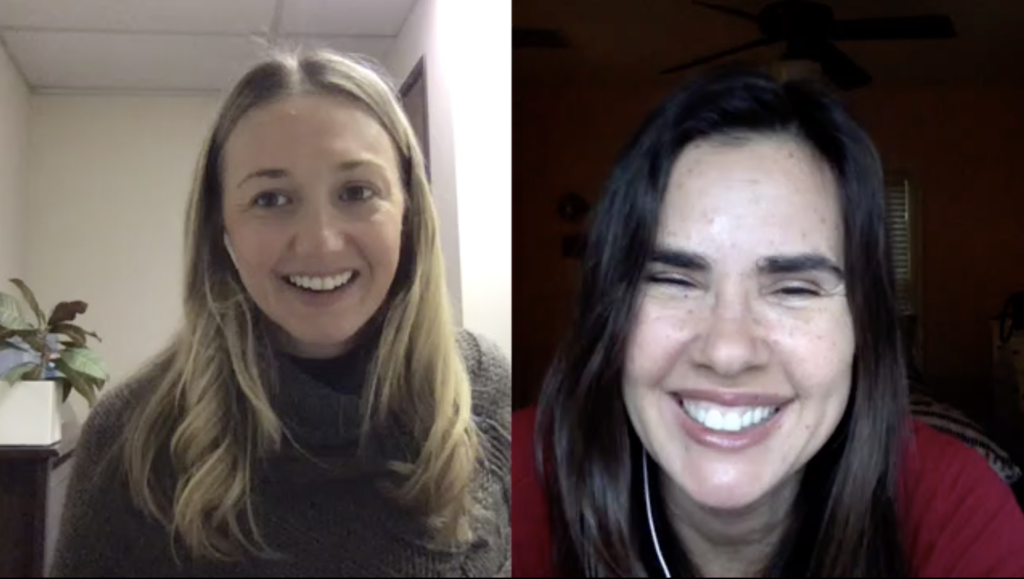
Hello there CBT School friends and family,
This week we have a SUPER exciting episode of Your Anxiety Toolkit Podcast to share with you. If you are someone who is hard on yourself, this is THE episode for you. If you are someone who beats yourself up, this is the episode for you. If you need help being self-compassionate, THIS IS THE EPISODE FOR YOU!
I am so thrilled to share with you this week's podcast guest, Kristin Neff.
Kristin Neff is a pioneering self-compassion researcher, author of one of my favorite workbooks called The Mindful Self-Compassion Workbook, and is a wise and informative teacher of self-compassion. Kristin Neff developed an 8-week online program that teaches self-compassion skills to those who struggle in this area. The program, co-created with her colleague Chris Germer, affiliated with Harvard Medical School, is called Mindful Self-Compassion.
In this episode of Your Anxiety Toolkit Podcast, Kristin Neff addresses what self-compassion is and what it is not. I found this to be incredibly informative, especially for those who struggle to differentiate between self-compassion and self-care. Kristin Neff also addresses why some people struggle with practicing self-compassion, and specifically addresses the cultural and political aspects of this topic.
What I loved the most is how Kristin Neff explains whay self-compassion practices look like, feel like, and sound like. For those who need a most literal description of self-compassion, this conversation will be right up your alley. We also address the Yin & Yang of Self-Compassion and how we often forget the Yang component of Self-Compassion (listen to the full description).
Lastly, for those who find that their negative self-talk increases when they practice self-compassion, Kristin Neff addresses a concept called Backdrafting, and how this is a normal (and even positive) part of Self Compassion.
For more information on Kristin Neff, visit the links below:
Website: https://self-compassion.org
Workbook: https://self-compassion.org/mindful-self-compassion-workbook/
And lastly, please note that ERP School is available for one more week!
ERP School, our online course that teaches you all the most important components of ERP for Obsessive Compulsive Disorder, is BACK. Act fast because it is only available until February 14th, 2019!
Exposure and Response Prevention School (ERP School) is an online course that teaches you the tools and skills I teach my clients in my office. Let me tell you a little bit about it.
The course is a video-based course that includes modules on
- The science behind ERP
- Identifying YOUR obsessions and your compulsions
- The different approaches and types of ERP, including gradual exposure, writing scripts, interoceptive exposures and how to get creative with ERP
- Mindfulness tools to help you manage anxiety, panic, and uncertainty
- Troubleshoot common questions and concerns
- BONUS 6 videos of the most common subtypes of OCD, including Harm OCD.
The course also includes many downloadable PDF’s and activities to help you navigate how to best apply ERP to your specific obsessions and compulsions.
We are so excited to finally share ERP with you and would love to have you join us and the CBT School Community. It's a beautiful day to do hard things!
If you are worried about doing it alone, please don’t fear. We meet bi-monthly on the FB group and on Instagram to talk about questions you may have.
Click here to sign up. https://www.cbtschool.com/p/erp-school-lp
The Science of Exposure and Response Prevention (ERP)
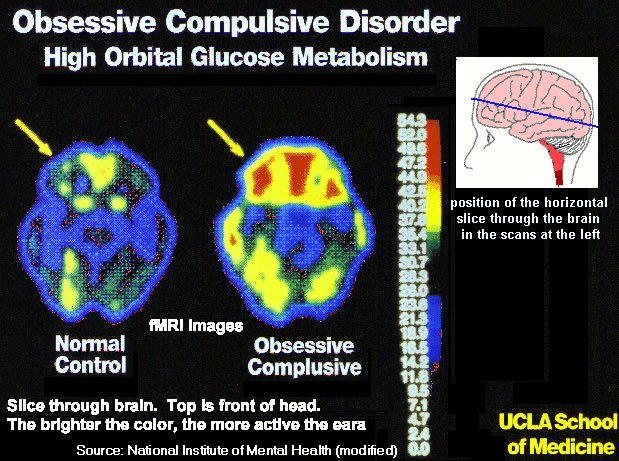
Welcome back to another episode of Your Anxiety Toolkit Podcast.
Today we are talking about the science behind Exposure and Response Prevention. I know a lot of you have a lot of questions about why we would ever put ourselves in a position to be MORE anxious and MOST uncertain. But, there are many reasons why and today we are going to dive into The Science of Exposure and Response Prevention .
To put it simply, we instinctually we run from fear. We go into fight, flight and freeze when we are faced with serious, dangerous events. In emergency situations, this is the most sophisticated human response. We are so lucky we have this response, as it keeps up alive and well.
However, in our era, we are often bombarded by THOUGHTS of serious, dangerous events and this causes our brain to make mistakes about the imminence of danger. We experience the thought as if it were an imminent threat - right here, danger in close quarters, etc.
The problem is that we react to this thought or sensation or urge as if it IS an imminent threat. We run away, we fight it or we freeze.
What happens when we do this is that we reinforce that the thought IS dangerous and, because we responded in this way, a cycle that is created. Fear --> avoidance response --> fear….and the cycle continues.
So, what can we do instead of fight, flight or freeze? We can stare our fear right in the face. We do this by performing Exposure and Response Prevention. Exposure and Response Prevention includes changing our behavior, or response, to the original thought or obsession and exposing ourselves to our feared consequence. Now, if you hate the idea of this, you are not alone.
In this week's podcast, we address the science behind Exposure & Response Prevention to help motivate and inform you of WHY ERP is so important and HOW it changes our brains. If you need help with this, now is the time to act.
ERP School, our online course that teaches you all the most important components of ERP for Obsessive Compulsive Disorder, is BACK, but act fast because it is only available until February 14th, 2019!
Exposure and Response Prevention School (ERP School) is an online course that teaches you the tools and skills I teach my clients in my office. Let me tell you a little bit about it.
The course is a video-based course that includes modules on
- The science behind ERP
- Identifying YOUR obsessions and your compulsions
- The different approaches and types of ERP, including gradual exposure, writing scripts, interoceptive exposures and how to get creative with ERP
- Mindfulness tools to help you manage anxiety, panic, and uncertainty
- Troubleshoot common questions and concerns
- BONUS 6 videos of the most common subtypes of OCD
The course also includes many downloadable PDF’s and activities to help you navigate how to best apply ERP to your specific obsessions and compulsions.
We are so excited to finally share ERP with you and would love to have you join us and the CBT School Community. It's a beautiful day to do hard things!
If you are worried about doing it alone, please don’t fear. We meet bi-monthly on the FB group and on IG to talk about questions you may have.
Click HERE to sign up.
Overcoming Harm OCD with Jon Hershfield
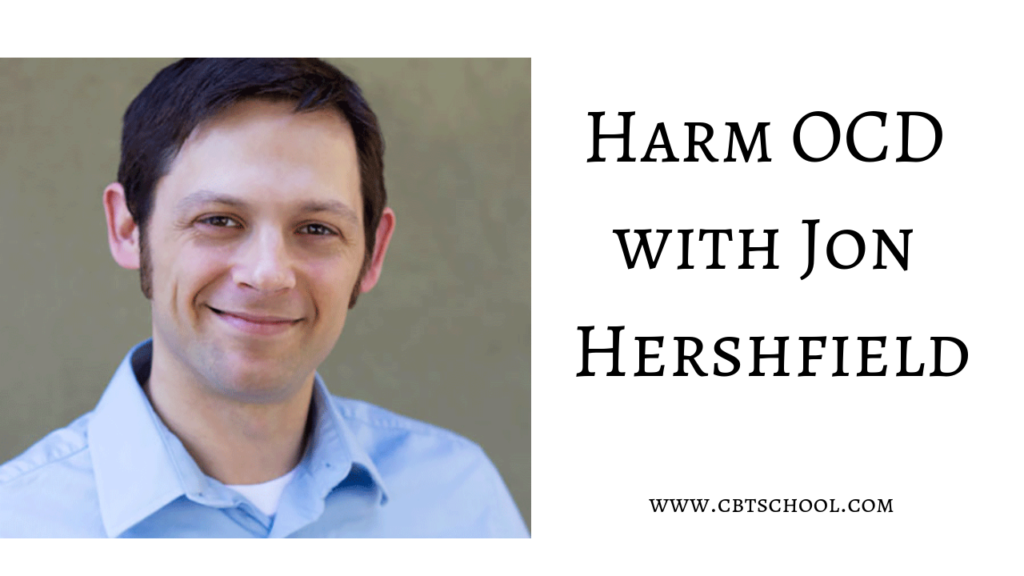
Welcome back to another episode of Your Anxiety Toolkit Podcast. Today we have a special guest, Jon Hershfield, LMFT. Jon has been on the show already and is a favorite among the CBT School-ers.
Today, Jon and I talk about how to manage specific obsessions related to violence and physical harm. In OCD terms, we call it Harm Obsessions or Harm OCD (if you meet the requirements for a diagnosis of Obsessive Compulsive Disorder or OCD).
In this episode, Jon answers some important questions such as:
- Does everyone have Harm Obsessions, thoughts, impulses or images?
- Why do these Harm Obsessions bother some people and not others?
- What is the difference between a Harm OCD and having thoughts about harm?
- Are people with Harm OCD any different than those who have other types of OCD?
- How do we treat Harm OCD?
This was such a fun episode and I really hope it helps those with harm obsessions, thoughts, images, impulses, and urges (Harm OCD).
Fore more information on Jon's latest book, Overcoming Harm OCD: Mindfulness and CBT Tools for Coping with Unwanted Violent Thoughts, click HERE.
For more information on Jon Hershfield, visit:
Website: Ocdbaltimore.com
Twitter: @cbtocd
IG: @ocdbaltimore
FB: @JonHershfield
GOOD NEWS!……WE HAVE A HUGE SURPRISE!
On January 28th, 2019, we are offering our FREE webinar called “10 THINGS YOU NEED TO KNOW ABOUT OCD.” This is a FREE online video course explaining exactly what OCD is, how to treat it and what complicating factors can occur during the process.
This free webinar will run daily at 6pm PST for one week ONLY. If you are not able to attend the free webinar, no stress! There will be a free replay sent to your inbox the day after signing up. I cannot wait to share this FREE educational resource with you.
CLICK HERE TO SIGN UP!
ALSO, ERP School is COMING BACK! Exposure and Response Prevention School is an online course that teaches you the tools and skills I teach my clients in my office. Let me tell you a little bit about it. The course is a video-based course that includes modules on:
- The science behind ERP
- Identifying YOUR obsessions and your compulsions
- The different approaches and types of ERP, including gradual exposure, writing scripts, interoceptive exposures and how to get creative with ERP
- Mindfulness tools to help you manage anxiety, panic and uncertainty
- Troubleshoot common questions and concerns
- BONUS 6 videos of the most common subtypes of OCD, including Harm OCD.
The course also includes many downloadable PDF’s and activities to help you navigate how to best apply ERP to your specific obsessions and compulsions.
We are so excited to finally share ERP with you and would love to have you join us and the CBT School Community. It’s a beautiful day to do hard things!
If you are worried about doing it alone, please don’t fear. We meet bi-monthly on the Facebook group and on Instagram to talk about questions you may have.
Click HERE to sign up.
Michelle Massi, LMFT, Talks To Us About Managing Social Anxiety
Welcome back to Your Anxiety Toolkit.
After multiple suggestions and requests, we are so excited to share with you an episode that focuses entirely on managing Social Anxiety. I am so excited to share with you the amazing, Michelle Massi (formally known as Michelle Otelsberg).
Michelle Massi, LMFT, is an OCD and Anxiety Specialist who has both a private practice in Encino and Westwood and also works at the UCLA OCD Intensive Treatment Program. Michelle works one-on-one and runs group therapy, and has a ton of experience treating Obsessive Compulsive Disorder (OCD), Social Anxiety, Panic Disorder, TICS, Body-Focused Repetitive Behavior’s (BFRBs) and other anxiety-related disorders.
In this episode of Your Anxiety Toolkit, we talk about all things Social Anxiety. Michelle and I talk about the presentation of Social Anxiety and different symptoms that can present when ones struggles with Social Anxiety. Michelle talks about different themes and fears related to social anxiety and how there is no one-size-fits-all approach to social anxiety presentation.
Michelle and I also discuss different approaches to Social Anxiety treatment and some fun ways to practice facing your fears and tolerating the fear of judgment from others. We discuss the use of Cognitive Therapy, Behavioral therapy, and Exposure and Response Prevention (ERP), as well as the use of Mindfulness and Acceptance and Commitment Therapy (ACT).
Also, please get super excited!
ERP School is BACK! Exposure and Response Prevention School is an online course that teaches you the tools and skills I teach my clients in my office. Let me tell you a little bit about it. The course is a video-based course that includes modules on
- The science behind ERP
- Identifying YOUR obsessions and your compulsions
- The different approaches and types of ERP, including gradual exposure, writing scripts, interoceptive exposures and how to get creative with ERP
- Mindfulness tools to help you manage anxiety, panic, and uncertainty
- Troubleshoot common questions and concerns
- BONUS 6 videos of the most common subtypes of OCD
The course also includes many downloadable PDF’s and activities to help you navigate how to best apply ERP to your specific obsessions and compulsions.
We are so excited to finally share ERP with you and would love to have you join us and the CBT School Community. It's a beautiful day to do hard things!
If you are worried about doing it alone, please don’t fear. We meet bi-monthly on the FB group and on Instagram to talk about questions you may have.
Click HERE to sign up.
For more information about Michelle, Anxiety Therapy LA, and the UCLA OCD Intensive Outpatient Program:
Anxiety Therapy LA: Anxietytherapyla.com
Instagram: @anxietytherapyla
UCLA OCD Program: https://www.semel.ucla.edu/ocd-itp
Steven Hayes Talks Acceptance & Commitment Therapy (ACT)
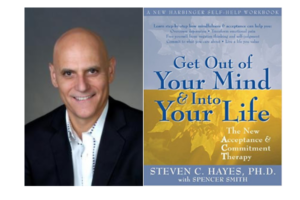 Welcome back to another INCREDIBLE episode of Your Anxiety Toolkit Podcast! Today we have an amazing guest, Steven Hayes.
Welcome back to another INCREDIBLE episode of Your Anxiety Toolkit Podcast! Today we have an amazing guest, Steven Hayes.
Steven Hayes is a clinical psychologist and professor at the University of Nevada. Steven Hayes has done so much for the psychology field, writing a whopping 44 books (wow, right?!) and many research articles. Steven Hayes also developed the evidence-based therapeutic modality that I use in my therapy office every day: Acceptance & Commitment Therapy (also known as ACT). ACT is a wonderful compliment to Exposure & Response Prevention (ERP), as it relies heavily on Mindfulness, positive reinforcement and using Value-Based Behaviors.
In this interview, Steven Hayes and I discuss what Acceptance & Commitment Therapy (ACT) involves and how we can learn to diffuse from our thoughts. You will find this especially helpful with you have anxiety, Obsessive Compulsive Disorder (OCD), Panic Disorder, Social Anxiety, and Depression, mostly because we tend to fuse a lot with our thoughts when we struggle with these disorders. However, the truth is, we all could learn the skill of diffusion and Steven Hayes does an amazing job of expelling why. Steven Hayes also teaches us useful ACT tools to stay present, and the practice of living a life that is based on values, not fear or anxiety.
My favorite part of the interview is where Steven Hayes discussed why our thoughts sometimes link together and how it is completely a waste of time trying to block, suppress or avoid thoughts. I am sure you will agree that Steven Hayes is a genius and that he has so much to teach us about our brain, our psyche and how we can react batter to our thoughts.
AND…..WE HAVE A HUGE SURPRISE!
ERP School is BACK! Exposure and Response Prevention School is an online course that teaches you the tools and skills I teach my clients in my office. Let me tell you a little bit about it. The course is a video based course that includes modules on:
- The science behind ERP
- Identifying YOUR obsessions and your compulsions
- The different approaches and types of ERP, including gradual exposure, writing scripts, and interoceptive exposures, as well as how to get creative with ERP
- Mindfulness tools to help you manage anxiety, panic and uncertainty
- Troubleshoot common questions and concerns
- BONUS 6 videos of the most common subtypes of OCD.
The course also includes many downloadable PDF’s and activities to help you navigate how to best apply ERP to your specific obsessions and compulsions.
We are so excited to finally share ERP with you and would love to have you join us and the CBT School Community. It’s a beautiful day to do hard things!
If you are worried about doing it alone, please don’t fear. We meet bi-monthly on the FB group and on Instagram to talk about questions you may have.
Click HERE to sign up.
If you would like further information on Steven Hayes and access to his FREE mini course, visit http://www.stevenchayes.com/. Click HERE for more info on Steven Hayes' workbook Get Out of Your Mind and Into Your Life, as well as his other books.
Staring Fear In The Face With Four Powerful Statements
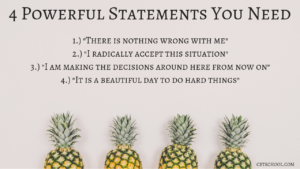 Hello there CBT School Rockstars! Happy New Year!
Hello there CBT School Rockstars! Happy New Year!
In this week’s episode of Your Anxiety Toolkit, I want to give you the 4 Powerful Statements you need in 2019. Even though this is directed at you for the new year, this episode is created in hope to get you ready for any circumstance and any time in your life.
So here they are!
The #1 Powerful Statement you need in 2019 is……. “There is nothing wrong with me”
The #2 Powerful Statement you need in 2019 is…….“I radically accept this situation”
The #3 Powerful Statement you need in 2019 is……….“I am making the decisions around here from now on”
The #4 Powerful Statement you need in 2019 is……“It is a beautiful day to do hard things”
The whole purpose of this podcast episode is to help you move away from a life where fear makes all of your decisions and towards a life where we stare fear in the face and live the life we want to live as if fear wasn’t there at all. We want to ask ourselves what we would do if fear never showed up and then go live that life while only bringing fear along for the ride.
CBTschool.com has many ways we want to help you “do hard things” in 2019 and we hope that these 4 Powerful Statements will help you move in that direction.
We are excited to announce that ERP School is coming back in January. Click HERE for more info. ERP School is an online course that teaches all the Exposure & Response Prevention Tools you will need to manage Obsessive Compulsive Disorder, Panic Disorder, Health Anxiety, and Social Anxiety.
We are also excited to announce that BFRB School is also coming back in January. Click HERE for more info. BFRB School is a course that teaches those with Compulsive Skin Picking (Dermatillomania & Excoriation Disorder), Hair Pulling (Trichotillomania) and Compulsive Nail Biting the science-based tools they need to manage their symptoms and live a full life.
Sending you much love and healing vibes,
Kimberley